Mo Brooks and Gary Palmer urge FBI director to call Congressional shooting an ‘act of domestic terrorism’
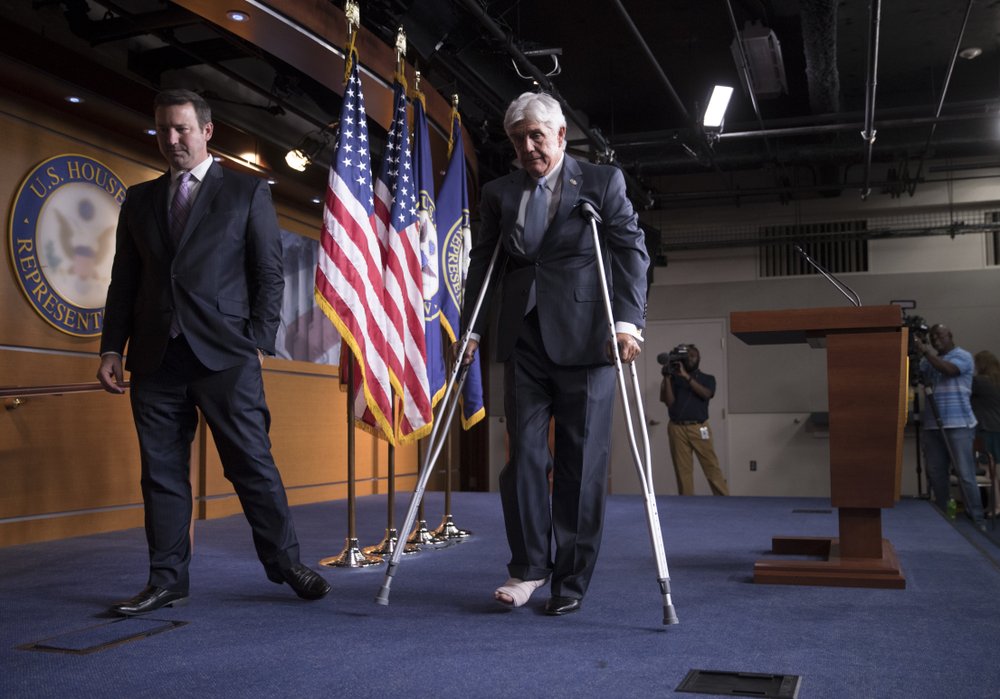
Mo Brooks and Gary Palmer joined other leaders, sending a letter to FBI Director Christopher Wray. The letter urges Wray to call the 2017 shooting on Congress during a baseball game an act of domestic terrorism. Four people were shot during the practice session for the Annual Congressional Baseball game, including Congressman Steve Scalise, Capitol police officer Crystal Griner, congressional aide Zack Barth, and lobbyist Matt Mika. The shooter, James Hodgkinson, was shot and died from his wounds. According to CNN, Hodgkinson was a small business owner in Illinois who was very public on social media about his support of Bernie Sanders and his hatred of conservatives and President Donald Trump. Brooks stated on Twitter, “I joined several GOP colleagues who were targeted in 2017 by a Socialist gunman in sending a letter to @FBI Dir Wray, urging him to call the shooting what it was: an act of domestic terrorism that sought to assassinate Republican members of Congress. It was not “suicide by cop.” I joined several GOP colleagues who were targeted in 2017 by a Socialist gunman in sending a letter to @FBI Dir Wray, urging him to call the shooting what it was: an act of domestic terrorism that sought to assassinate Republican members of Congress. It was not “suicide by cop.” pic.twitter.com/gYj9fwOtLI — Mo Brooks (@RepMoBrooks) May 12, 2021 Other leaders who signed the letter include H. Morgan Griffith, Rodney Davis, Jeff Duncan, Barry Loudermilk, John Moolenaar, Jack Bergman, Roger Williams, Scott DesJarlais, Bill Johnson, Chuck Fleischmann, Kevin Brady, Trent Kelly, and Jim Jordan.
Will Ainsworth: Amazon workers recognize union’s threat to Alabama economy

For the last few decades, our state has proudly led both the southeast and the nation in economic development, industrial recruitment, and job creation, and closets at the Alabama Department of Commerce are overflowing with awards recognizing our successes and shovels commemorating groundbreakings. Even today, as the U.S. continues to struggle with the economic fallout from the global COVID-19 pandemic, Alabama is faring better than most other states with regards to incoming tax revenues, and our employment rate ranks in the Top Ten in the nation. Though some of our citizens remain jobless and in obvious need of help, Alabama’s economic blessings are abundant. Much of our success in attracting industries and promoting economic expansion can be attributed to the fact that Alabama is a “right to work” state that protects every citizen’s ability to hold a job without being forced to join a union. Because the right to work is so deeply ingrained in Alabama’s social fabric and DNA, voters in 2016 approved a constitutional amendment that shields workers from having labor unions forced upon them, and it passed with 70 percent of the statewide vote. Given the choice between locating in an open, free-market state like Alabama or one that embraces the high costs and Orwellian employment mandates of labor unionism, most businesses, regardless of size or industry, will choose to locate here. Certainly, the explosive growth of Alabama’s automotive manufacturing sector and aerospace industry offer both strong and irrefutable evidence of that fact. One of our state’s newest and fast-growing corporate citizens is Amazon, which announced, built, and opened a massive order fulfillment center in Bessemer just before the COVID-19 pandemic struck with full force. Employing just shy of 6,000 full-time and seasonal Alabama employees who earn average pay eclipsing $15.00 an hour along with generous health benefits, Amazon is already expanding its presence and workforce with the construction of two additional Birmingham-area delivery stations. But much of that rapid expansion and the jobs and opportunities would have come to a quick and sudden halt if the Retail, Wholesale, and Department Store Union (RWDSU) had been successful in organizing workers in Amazon’s Alabama facilities. The fact that U.S. Senator Bernie Sanders, a self-avowed “democratic socialist,” and radical Congresswoman Alexandria Ocasio-Cortez repeatedly voiced strong public support for the unionization efforts in Alabama indicate that it was not in the best interest of our conservative, Pro-Trump state, its economy, or the workers who reside here. Keep in mind that in 2019, RWDSU, Sanders, AOC, and other members of the furthest fringes of the left formed a coalition that forced Amazon to abandon plans for a $1.7 billion facility in New York that would have employed 25,000 workers. Organizing the labor force in Bessemer could have prompted Amazon to swiftly reverse course, relocate its expansion, and re-examine its current presence and investment in Alabama. Moreover, policies advocated by unions like RWDSU often work against the interests of many of the employees it claims to represent. Labor unions, for example, often demand pay be based upon longevity of employment rather than the quality and merit of the work that is accomplished. Under that scenario, an employee who works hard, excels, proves especially productive, and separates themselves from the rest of the pack cannot be paid more than a previously hired worker who simply shows up and punches the time clock. Such a system stifles incentive, blocks promotion, and prevents the best and most eager employees from moving ahead and providing a better life for their families. Younger workers with bright futures are especially held back by those policies. Keeping Alabama economically healthy during a public health crisis is an incredibly difficult task, and unionizing a major employer as it works to create even more jobs and further invest in our state is not the way to accomplish that goal. Luckily, Amazon’s workers in Alabama voted overwhelmingly last week to reject the organized labor effort and refused to surrender their jobs to the labor union bosses and liberal leaders who wished to control them. Because of the wise choice made by Amazon’s employees, Alabama will continue to be fertile ground for growing jobs and opportunities, and our best days still remain ahead of us. Will Ainsworth is the Lieutenant Governor of Alabama.
‘Treating us like robots’: Amazon workers seek union
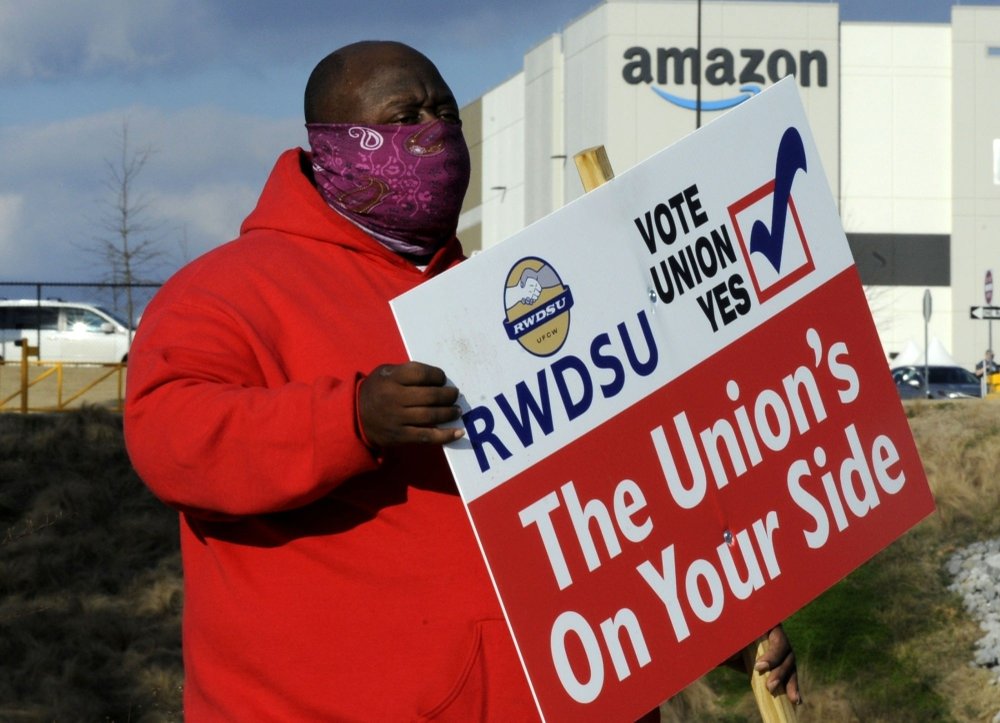
Linda Burns was excited at first to land a job at the Amazon warehouse outside Birmingham, Alabama. The former nursing assistant had always enjoyed ordering from the company, Now, she would be working for them. A cog in a fast-moving assembly line, her job involved picking up customers’ orders and sending them down the line to the packers. Now she is a staunch supporter of getting a union at the Bessemer facility. She said employees face relentless quotas and deserve more respect. “They are treating us like robots rather than humans,” said Burns, 51, who said she is out of leave after developing tendonitis. This week, Amazon workers and union advocates, including Vermont Sen. Bernie Sanders, made a last-minute push as voting comes to a close in the high-stakes union battle. If organizers are successful, it could lead to a chain reaction of other unionization pushes at Amazon facilities. If voted down, it would be another loss for organizers hoping to win a rare labor victory in the Deep South. Amazon is fighting the union. The company argues the warehouse created thousands of jobs with an average pay of $15.30 per hour — more than twice the minimum wage in Alabama. Workers also get benefits including health care, vision and dental insurance without paying union dues, the company said. Sanders spoke at a union rally in Birmingham on Friday, saying a labor victory against the tech and retail giant owned by the richest person in world — and in a historically anti-union state — would resonate across the country. “What you are doing here is historical, historical, because all over this country people are sick and tired of being exploited, sick and tired of not having the dignity that they deserve. And your message to people all over this country is stand up and fight back,” Sanders said. “This country belongs to all of us, not just a handful of billionaires,” the former Democratic presidential candidate said. Ahead of Sanders’ visit, Amazon CEO Dave Clark tweeted that they “actually deliver” a progressive workplace with a $15 hourly minimum wage and good health benefits that Sanders said he supports. “So, if you want to hear about $15 an hour and health care, Senator Sanders will be speaking downtown. But if you would like to make at least $15 an hour and have good health care, Amazon is hiring,” Clark tweeted. Burns and Harvey Wilson, a 41-year-old who works as a “picker” at Amazon, both said they’re supporting the union because of poor working conditions at the warehouse. Employees face relentless quotas and the mammoth size of the facility makes it nearly impossible to get to the bathroom and back to your station during a workers’ break time, they said. “How could you work for somebody who is trillion, billion whatever you want to call it, how can you work for them and they don’t want you to go to the bathroom?” Burns said. Wilson said he is unsure how the vote would go because a number of younger workers are fearful they could lose benefits. “A lot of people are scared to vote because they are afraid they are going to lose their jobs,” Wilson said. Employees are seeking to be represented by the Retail, Wholesale and Department Store Union. Ballots on the vote must be returned by Monday. The vote in Alabama comes after efforts to start unions at Southern auto plants came up short. Emmit Ashford, a part-time Amazon worker, said that even if the vote fails, he believes the workers in Bessemer have ignited something. “No matter what happens with this vote, the bell has been rung and it won’t stop here. We will not stop fighting,” Ashford said at a rally ahead of the vote. Republished with the permission of the Associated Press.
Amid high-stakes union vote, Bernie Sanders to visit Bessemer Amazon plant

Senator Bernie Sanders is planning to visit the Amazon facility in Bessemer, Alabama, this Friday. Sanders will join Michael “Killer Mike” Render and Danny Glover to visit with Amazon workers trying to unionize with the Retail, Wholesale and Department Store Union (RWDSU). Actor Danny Glover visited the center last month as well, according to Al.com. The RWDSU is a union organization with over 80 years of history. They’ve successfully helped unionize major retailers like H&M, Zara, and Macy’s. The Bessemer Alabama facility is coming close to creating a union at Amazon, a feat that hasn’t been attempted since 2014 when a much smaller group of workers in Delaware attempted to unionize. The attempt ultimately failed. Sanders has been publicly supportive of the efforts in Bessemer. During a hearing of the Senate Budget Committee hearing, Sanders said he planned on asking Amazon CEO Jeff Bezos, “You are worth $182 billion, that’s billion with a B. You’re the wealthiest person in the world. Why are you doing everything in your power to stop your workers in Bessemer, Ala., from joining a union so they can negotiate for better wages, better benefits, and better working conditions?” In February, Sanders showed his support by sending pizzas to a union rally, Al.com reported. Sanders tweeted out his support for the Amazon workers in Bessemer, stating, “I stand in solidarity with Amazon workers in Alabama who are today beginning to vote in a historic union election. If they win, it will not only improve wages and working conditions in Bessemer, but it will also send a shockwave around the country.” I stand in solidarity with Amazon workers in Alabama who are today beginning to vote in a historic union election. If they win, it will not only improve wages and working conditions in Bessemer, but it will also send a shockwave around the country.https://t.co/namvkT16zx — Bernie Sanders (@BernieSanders) February 8, 2021 President Joe Biden also expressed his support in February, stating, “Workers in Alabama – and all across America are voting on whether to organize a union in their workplace. It’s a vitally important choice – one that should be made without intimidation or threats by employers. Every worker should have a free and fair choice to join a union.” Workers in Alabama – and all across America – are voting on whether to organize a union in their workplace. It’s a vitally important choice – one that should be made without intimidation or threats by employers. Every worker should have a free and fair choice to join a union. pic.twitter.com/2lzbyyii1g — President Biden (@POTUS) March 1, 2021
Minimum wage hike all but dead in big COVID relief bill
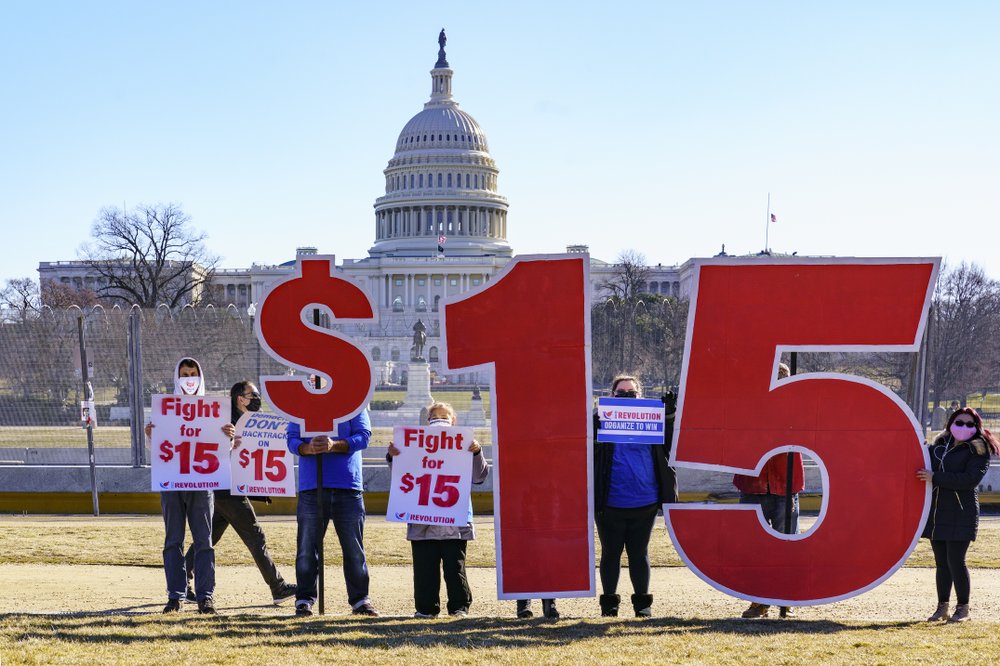
Democrats’ hopes of including a minimum wage increase in their $1.9 trillion COVID-19 relief bill seemed all but dead Monday as the Senate prepared to debate its own version of the House-passed aid package. Four days after the chamber’s parliamentarian said Senate rules forbid inclusion of a straight-out minimum wage increase in the relief measure, Democrats seemed to have exhausted their most realistic options for quickly salvaging the pay hike. In one decision, they abandoned a potential amendment threatening tax increases on big companies that don’t boost workers’ pay to certain levels. “At this moment, we may not have a path but I hope we can find one” for pushing the federal pay floor to $15 an hour, said No. 2 Senate Democratic leader Richard Durbin of Illinois. Senate Democrats hope to unveil their version of the broad relief package and begin debate as early as Wednesday. Congressional leaders want to send President Joe Biden the legislation combating the pandemic and bolstering the economy by March 14, the date emergency jobless benefits that lawmakers approved in December expire. The overall relief bill is Biden’s biggest early legislative priority. It looms as an initial test of his ability to unite Democrats in the Senate — where the party has no votes to spare — and risks lasting damage to his influence should he fail. Republicans are strongly against the legislation and could well oppose it unanimously, as House GOP lawmakers did when that chamber approved the bill early Saturday. The measure would provide $1,400 payments to individuals plus hundreds of billions of dollars for schools and colleges, COVID-19 vaccines and testing, mass transit systems, renters, and small businesses. It also has money for child care, tax breaks for families with children, and assistance for states willing to expand Medicaid coverage for low-income residents. Senate Budget Committee Chairman Bernie Sanders, I-Vt., said he wanted Democrats to ignore the parliamentarian’s ruling blocking the minimum wage increase. He also wants them to vote to eliminate filibusters — procedural delays that would take an unachievable 60 votes for Democrats to prevail. Neither idea seemed to have the support among Democrats or the White House needed to succeed. But Sanders, the Senate’s lead sponsor of the hike to $15, said he’d force a vote on an amendment restoring the minimum wage increase anyway. “This is the soul of the Democratic Party,” he said of the proposal. In an acknowledgment that his effort might fall short, he said, “If we fail in this legislation, I will be back” and offer it in the near future. The Senate is divided 50-50 between the parties with Vice President Kamala Harris able to cast only tie-breaking votes. Democrats are employing a seldom-used procedure for the COVID-19 relief bill that will shield the measure from filibusters. Biden discussed the relief bill Monday in a virtual meeting with nine Senate Democrats, including Joe Manchin of West Virginia, an opponent of the $15 hourly target. A White House statement said the group was “united in the goal of quickly passing a significant package that reflects the scope of the challenges our country is facing.” Democrats, who will need unanimity to pass the legislation, are pushing for several changes in the House measure. Manchin told reporters he wants the bill’s emergency unemployment benefits, set at $400 weekly by the House, to revert to the current $300 figure enacted in December. That is certain to be divisive and draw strong opposition from progressives. He and Sen. Jon Tester, D-Mont., also said they want spending to be better “targeted,” which Manchin said meant “helping the people that need help the most.” Republicans have said the legislation is too costly and spends money needlessly. Sen. Angus King, I-Maine, said he wants the bill’s $350 billion for state and local governments to specify minimum amounts for municipal governments and wants perhaps $50 billion to improve broadband coverage. The parliamentarian ruled Monday that some House-approved provisions, which would provide billions to help some struggling pension plans and to help people who’ve lost jobs afford health insurance, could stay in the bill, according to Senate Finance Committee Chairman Ron Wyden, D-Ore. The House-approved minimum wage language would gradually raise the federal floor to $15 an hour by 2025, more than double the $7.25 in place since 2009. After the parliamentarian said that provision would have to be deleted, Sanders and Wyden said they were working on plans to increase taxes on large corporations that don’t meet certain levels for workers’ pay. But that plan was dropped, Democrats said Monday, with Sanders saying the proposal would have been too easy for employers to evade. It was always questionable whether pressuring companies with tax increases would have won enough Democratic support to survive, and the idea would have affected only a fraction of workers paid the minimum wage. Raising the minimum wage has broad support among Democrats. But while it’s embraced passionately by the party’s progressives, at least two Senate moderates — Manchin and Kyrsten Sinema of Arizona — have voiced opposition to including it in the broader relief measure, wounding its prospects and fostering tensions within the party. Democrats must now decide “how we do minimum wage as part of another piece of legislation or on its own,” said Sen. Richard Blumenthal of Connecticut. While eliminating filibusters or overruling the parliamentarian has strong support among progressives, the ideas lack appeal to moderates. They are wary of erasing procedures that the party has used in the past, and could use again, to protect its priorities when it is in the minority. Among those who’ve long supported retaining the filibuster is Biden, who served nearly four decades in the Senate. “The president’s view on the filibuster is well known. He has not changed that point of view,” White House press secretary Jen Psaki said pointedly Monday. Republished with the permission of the Associate Press.
Joe Biden faces questions about commitment to minimum wage hike
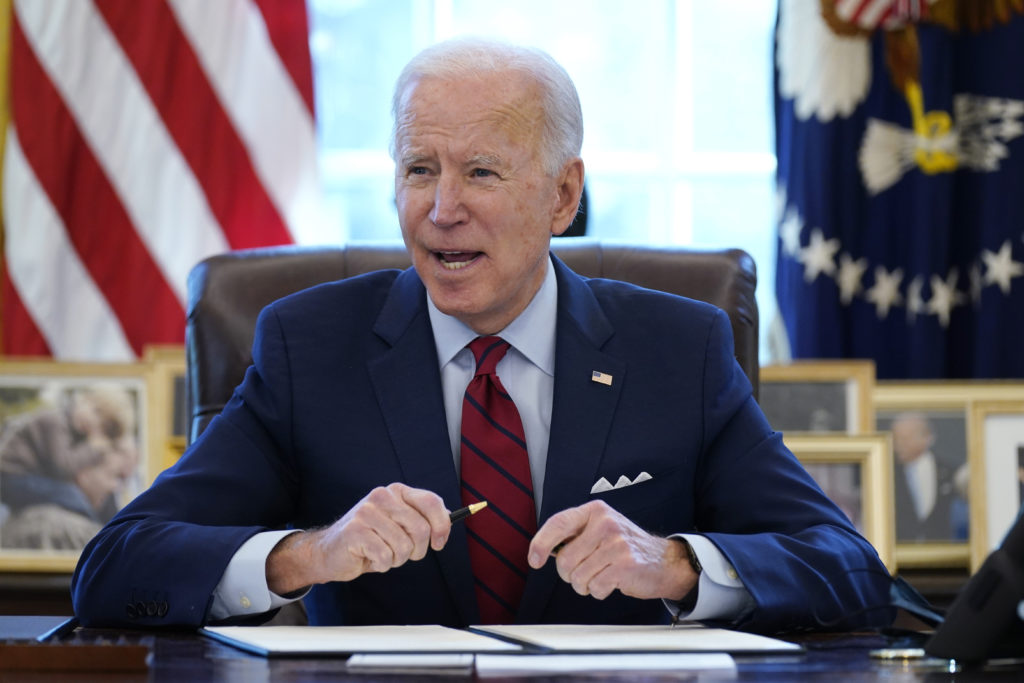
Union activist Terrence Wise recalls being laughed at when he began pushing for a national $15 per hour minimum wage almost a decade ago. Nearly a year into the pandemic, the idea isn’t so funny. The coronavirus has renewed focus on challenges facing hourly employees who have continued working in grocery stores, gas stations, and other in-person locations even as much of the workforce has shifted to virtual environments. President Joe Biden has responded by including a provision in the massive pandemic relief bill that would more than double the minimum wage from the current $7.25 to $15 per hour. But the effort is facing an unexpected roadblock: Biden himself. The president has seemingly undermined the push to raise the minimum wage by acknowledging its dim prospects in Congress, where it faces political opposition and procedural hurdles. That’s frustrating to activists like Wise, who worry their victory is being snatched away at the last minute despite an administration that’s otherwise an outspoken ally. “To have it this close on the doorstep, they need to get it done,” said Wise, a 41-year-old department manager at a McDonald’s in Kansas City and a national leader of Fight for 15, an organized labor movement. “They need to feel the pressure.” The minimum wage debate highlights one of the central tensions emerging in the early days of Biden’s presidency. He won the White House with pledges to respond to the pandemic with a barrage of liberal policy proposals. But as a 36-year veteran of the Senate, Biden is particularly attuned to the political dynamics on Capitol Hill and can be blunt in his assessments. “I don’t think it’s going to survive,” Biden recently told CBS News, referring to the minimum wage hike. There’s a certain political realism in Biden’s remark. With the Senate evenly divided, the proposal doesn’t have the 60 votes needed to make it to the floor on its own. Democrats could use an arcane budgetary procedure that would attach the minimum wage to the pandemic response bill and allow it to pass with a simple majority vote. But even that’s not easy. Some moderate Democratic senators, including Joe Manchin of West Virginia and Krysten Sinema of Arizona, have expressed either outright opposition to the hike or said it shouldn’t be included in the pandemic legislation. The Senate’s parliamentarian may further complicate things with a ruling that the minimum wage measure can’t be included in the pandemic bill. For now, the measure’s most progressive Senate backers aren’t openly pressuring Biden to step up his campaign for a higher minimum wage. Bernie Sanders, the chair of the Senate Budget Committee, has said he’s largely focused on winning approval from the parliamentarian to tack the provision onto the pandemic bill. Sen. Elizabeth Warren, who like Sanders challenged Biden from the left for the Democratic nomination, has only tweeted that Democrats should “right this wrong.” Some activists, however, are encouraging Biden to be more aggressive. The Rev. Dr. William J. Barber II, the co-chair of the Poor People’s Campaign, said Biden has a “mandate” to ensure the minimum wage increases, noting that minority Americans were “the first to go back to jobs, first to get infected, first to get sick, first to die” during the pandemic. “We cannot be the last to get relief and the last to get treated and paid properly,” Barber said. The federal minimum wage hasn’t been raised since 2009, the longest stretch without an increase since its creation in 1938. When adjusted for inflation, the purchasing power of the current $7.25 wage has declined more than a dollar in the last 11-plus years. Democrats have long promised an increase — support for a $15 minimum wage was including in the party’s 2016 political platform — but haven’t delivered. Supporters say the coronavirus has made a higher minimum wage all the more urgent since workers earning it are disproportionately people of color. The liberal Economic Policy Institute found that more than 19% of Hispanic workers and more than 14% of Black workers earned hourly wages that kept them below federal poverty guidelines in 2017. Blacks, Hispanics, and Native Americans in the U.S. also have rates of hospitalization and death from COVID-19 that are two to four times higher than for whites, according to the Centers for Disease Control and Prevention. People of color are a vital part Biden’s constituency, constituting 38% of his support in November’s election, according to AP VoteCast, a nationwide survey of the electorate. Adrianne Shropshire, executive director of BlackPAC, noted that Biden has promised to address racial inequalities and create a more fair economy. That means he now has a chance to ensure that hourly wage earners “come out of this pandemic in better shape than they went into it.” “The recovery around COVID shouldn’t just be about how to stabilize and get people back to zero,” Shropshire said. “It should be about how do we create opportunities to move people beyond where they were.” The White House says Biden isn’t giving up on the issue. His comments to CBS, according to an aide, reflected his own evaluation of where the parliamentarian would rule based on his decades of experience in the Senate dealing with similar negotiations. Biden suggested in the same interview that he’s prepared to engage in a “separate negotiation” on raising the minimum wage, but White House press secretary Jen Psaki offered no further details on the future of the proposal if it is in fact cut from the final coronavirus aid bill. One option could be forcing passage by having Vice President Kamala Harris, as the Senate’s presiding officer, overrule the parliamentarian. But Psaki was clear in opposing that: “Our view is that the parliamentarian is who is chosen, typically, to make a decision in a nonpartisan manner.” Navin Nayak, executive director of the Center for American Progress Action Fund, the political arm of the progressive think tank, said he wasn’t surprised at Biden’s assessment, but still feels the White House is
Dems propose $1,400 payments as part of Joe Biden virus relief plan
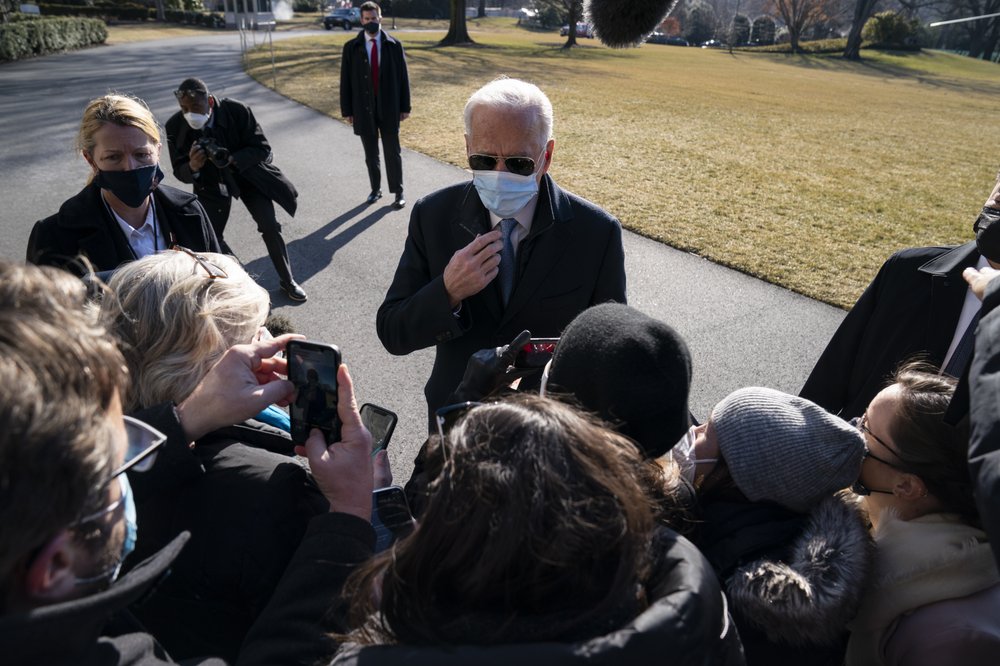
House Democrats on Monday proposed an additional $1,400 in direct payments to individuals as Congress began piecing together a $1.9 trillion COVID-19 relief package that tracks President Joe Biden’s plan for battling the pandemic and reviving a still staggering economy. Democrats on the Ways and Means Committee would expand tax credits for families with children, for lower-earning people, and those buying health insurance on marketplaces created by the 2010 Affordable Care Act. The panel, which plans to approve the measure by week’s end, would also provide health care subsidies for some unemployed workers. Less than three weeks into his presidency, Biden has declared that vanquishing the virus and resuscitating the economy are his top priorities. The coronavirus pandemic has killed over 460,000 Americans while the economy has lost 10 million jobs since the crisis began last year. Monday’s Ways and Means unveiling of its piece of the package — at over $900 billion, nearly half of Biden’s entire plan — came with Congress’ Democratic leaders hoping to rush the legislation to the president for his signature by mid-March, when existing emergency unemployment benefits expire. Their schedule reflects a desire by Biden and congressional Democrats to show they can respond swiftly and decisively to the crisis, even if, as seems likely, they must muscle past solid Republican opposition. “While it is still our hope that Republicans will join us in doing right by the American people, the urgency of the moment demands that we act without further delay,” said Ways and Means Chairman Richard Neal, D-Mass. Texas Rep. Kevin Brady, top Republican on that committee, criticized Democrats for driving ahead on the massive measure “without bipartisan compromise.” He said the GOP wants to focus on vaccine distribution and more targeted relief for workers, families, and small businesses — essentially previewing amendments Republicans are expected to propose during committee votes this week, some of which might win Democratic backing. House Education and Labor Committee Democrats also previewed their plans Monday. Their $350 billion package includes $130 billion to help schools reopen safely, $40 billion for colleges battered by the pandemic, and a plan to gradually raise the federal minimum wage to $15 an hour. The minimum wage increase faces an uphill climb, and even Biden has conceded it likely won’t survive. The Financial Services Committee proposal includes $50 billion to help the Federal Emergency Management Agency handle pandemic costs, plus $25 billion for struggling rental property owners and people at risk of homelessness. Transportation and Infrastructure Committee spending would include grants of $30 billion for struggling public transit agencies with starkly reduced ridership. Democrats have only narrow House and Senate majorities. Besides Republican opposition that could be unanimous, Democrats will have to balance party moderates who worry about a package going too far and progressives eager to push Biden as far leftward as they can. In one potential battleground within the party, the Ways and Means Democrats proposed limiting the full $1,400 relief payments to individuals making $75,000 or less, and phasing them out until they end completely at $100,000. Couples who make up to $150,000 would be entitled to $2,800 relief payments, which would gradually diminish and fully disappear for those earning $200,000. The income levels at which people qualify for the direct payments has caused rifts among Democrats, with moderates arguing that relief should be more narrowly targeted to people most in need. Biden has said he will not allow the per-person payments to fall below $1,400 but has indicated flexibility on the income thresholds. “There is a discussion right now about what that threshold will look like. A conclusion has not been finalized,” said White House press secretary Jen Psaki. Congress approved $600 per person direct payments in December. The additional $1,400 would bring the total to $2,000. Democrats have sought that amount for months, and it won support from then-President Donald Trump during his unsuccessful reelection campaign, even as it was opposed by many congressional Republicans. The Ways and Means proposal would increase emergency jobless aid to $400 weekly from its current $300. Benefits would last until Aug. 29, instead of March 14 as now scheduled. The new amount is still below the original $600 extra weekly benefit that was enacted last March but expired July 31. The plan would fight child poverty by increasing the child tax credit for families for one year. Now a maximum $2,000 annually, it would grow to up to $3,600 per child under 6 and as much as $3,000 for those up to age 17. Payments of the credit would be made monthly, even to families that owe no federal income taxes — a change from current policy. The bill also provides several pathways for people to get and keep health insurance, including an early test of Biden’s pledge to build on Obama’s health care law. One section would sweeten the subsidies provided under former President Barack Obama’s health law. The Biden administration has already announced a three-month special sign-up period for ACA coverage starting next Monday. The more generous financial assistance in the House bill would be available for this year and next. The bill would also cover 85% of the cost of premiums for workers trying to preserve their job-based health insurance after getting laid off. A federal law known as COBRA already allows them to temporarily keep their old employer’s health plan, but they typically have to pay prohibitively high premiums. The assistance would be available through Sept. 30. For workers without children, the plan proposes a significant expansion of the earned-income tax credit — a refundable credit currently claimed by taxpayers who earn an average of $20,000 a year. The EITC is viewed by its proponents as a major anti-poverty tool for working people. The legislation calls for the maximum credit for workers without children to be nearly tripled and for wider eligibility. It also contains tax breaks for some restaurants that have received pandemic aid. The bills’ details were announced as a report by the nonpartisan Congressional
Democrats prep Joe Biden’s virus aid package with or without GOP
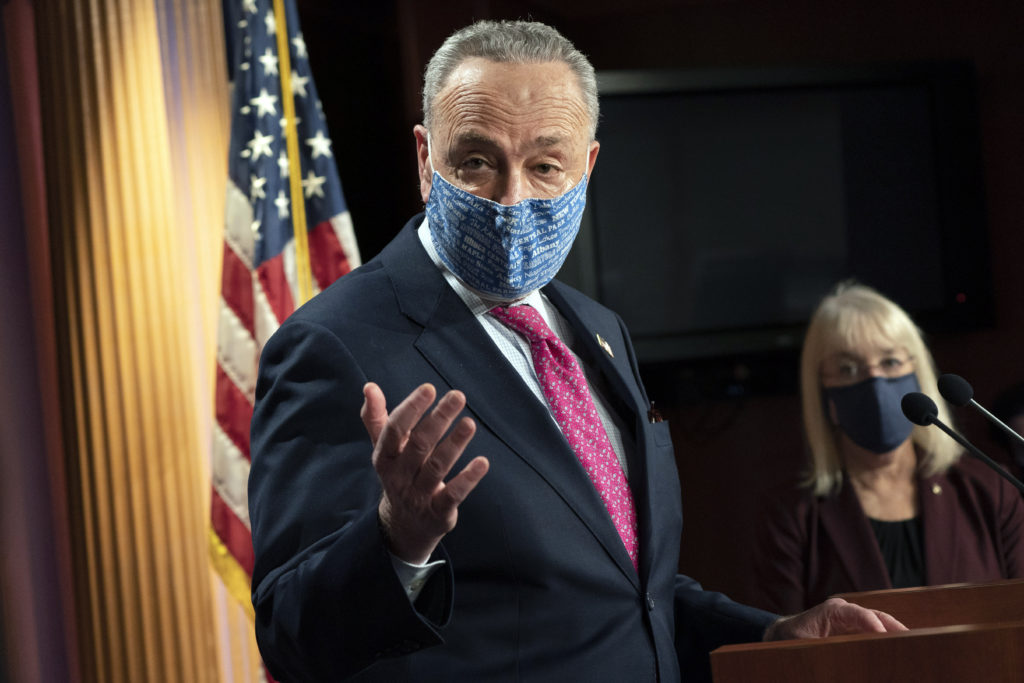
Senate Democrats are preparing to push ahead quickly on President Joe Biden’s $1.9 trillion COVID-19 relief package even if it means using procedural tools to pass the legislation on their own, leaving Republicans behind. Senate Majority Leader Chuck Schumer told senators to be ready to vote as soon as next week on a budget reconciliation package that would lay the groundwork for swift passage. Coming so soon in Biden’s administration, the action provides a first test of Republican opposition to the White House priorities as well as to the new president’s promise of a “unity” agenda. “The work must move forward, preferably with our Republican colleagues, but without them if we must,” Schumer said after a private meeting of Democratic senators. “Time is of the essence to address this crisis. We’re keeping all options open on the table.” Unwilling to wait for Republicans who argue Biden’s price tag is too high and his priorities too wide-ranging, Democrats are flexing their newfound power as they take control of the Senate alongside the House and White House. It is the first time in a decade the party has held the full sweep of power in Washington, and Democrats say they have no time to waste trying to broker compromises with Republicans that may, or may not, happen. They have watched Republicans use similar procedural tools to advance their priorities, most recently the Trump administration’s GOP tax cuts. The fast-moving events days into the new majority on Capitol Hill come as the White House continued meeting privately with groups of Republican and Democratic lawmakers in hopes of striking a bipartisan agreement. Biden’s COVID-19 aid package includes money for vaccine distribution, school reopenings, and $1,400 direct payments to households and gradually boosts the federal minimum wage to $15 an hour over five years. The next steps remain highly fluid. The bipartisan Problem Solvers Caucus of more than 50 House lawmakers had a “productive meeting and constructive conversation” Tuesday with top administration officials on the virus aid and economic recovery package, according to a statement from Rep. Josh Gottheimer, D-N.J., and Rep. Tom Reed, R-N.Y., who co-chair the group. A White House official, who spoke on condition of anonymity to discuss the virtual conversation with the caucus, said there was agreement on the scope of the challenges facing the country and the need for additional relief. Biden and other members of his team intend to continue making their case to lawmakers about the need to act with urgency. Separately, the dozen senators who emerged from a lengthy private meeting with the White House on Sunday evening are talking on their own about trying to craft a more targeted bill. The bipartisan group of senators assembled privately again Monday evening. White House press secretary Jen Psaki told reporters earlier Tuesday that Biden is still looking to negotiate on an aid package, while emphasizing that several components of the existing aid will lapse in March. “He laid out his big package, his big vision of what it should look like, and people are giving their feedback,” Psaki said. “He’s happy to have those discussions and fully expects it’s not going to look exactly the same on the other end.” Sen. Susan Collins, R-Maine, who led a bipartisan effort for the last $900 billion relief package, is working again with the senators on crafting an alternative package that she has said would be more focused on money for vaccine distribution and tailored economic assistance to the neediest Americans. Collins said Tuesday that the White House made good on its commitment to deliver a more detailed accounting of the proposed expenditure. But she said the group is still waiting for data on how much funding remains unallocated from past relief measures that, by her tally, totals a whopping $1.8 trillion still unspent. Congress has approved some $4 trillion in emergency aid since the start of the coronavirus pandemic last year, a stunning outlay and the largest rescue package in the nation’s history. Senators from both parties who joined the White House call over the weekend agreed the priority needs to be standing up the country’s faltering vaccine distribution system. With the death toll climbing, and new strains of the virus threatening more trouble ahead, ensuring vaccinations appears to be crucial to stemming the COVID-19 crisis. Several senators from both parties also said they want the $1,400 direct checks to be more targeted to those in need. They also want an accounting of what remains from previously approved aid bills. But Sen. Bernie Sanders, an independent from Vermont and the incoming Budget Committee chair, said he is already working on the budget package for next week and expanding it to include Biden’s proposal to raise the federal minimum wage to $15 an hour over five years. Raising the wage is a long-running Democratic priority that would essentially double the current $7.25 hourly wage set the last time the party was in control in the Obama administration. Advocates say the pay raise would boost millions of full-time workers from poverty. “There is a consensus,” Sanders told reporters at the Capitol. “If Republicans are not prepared to come on board, that’s fine. We’re not going to wait. We’re going forward soon and aggressively.” Republished with the permission of the Associated Press.
Lawmakers press Donald Trump on relief bill as jobless aid expires
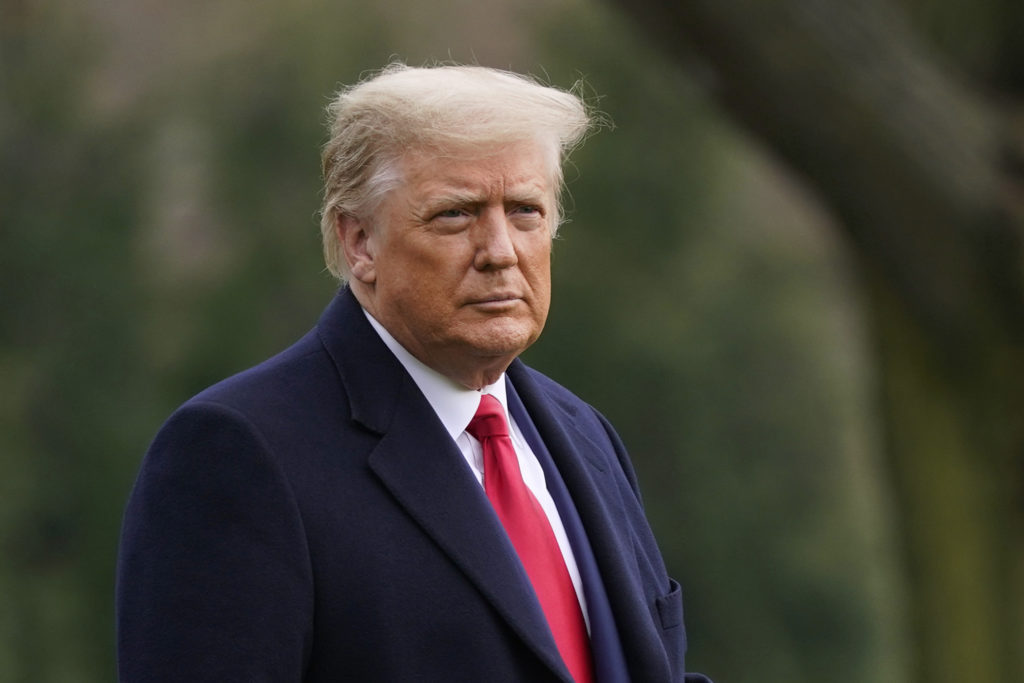
President Donald Trump appeared no closer to signing an end-of-year COVID relief and spending bill Sunday as unemployment aid expired, the government barrels toward a mid-pandemic shutdown and lawmakers implored him to break the impasse he created after Congress approved the deal. Trump blindsided members of both parties with a demand for larger COVID relief checks, imperiling not only a massive package of economic and public-health assistance but the basic functions of government itself. The package passed with wide margins in the House and Senate and with the understanding of members of both parties that Trump supported it. Now, the federal government will run out of money at 12:01 a.m. Tuesday if Trump refuses to sign the bill in time as he spends the holidays in Florida. In the face of economic hardship and spreading disease, lawmakers urged Trump on Sunday to sign the legislation immediately, then have Congress follow up with more. Aside from unemployment benefits and relief payments to families, money for vaccine distribution, businesses, cash-starved public transit systems and more is on the line. Protections against evictions also hang in the balance. “What the president is doing right now is unbelievably cruel,” Sen. Bernie Sanders of Vermont said Sunday. “So many people are hurting. … It is really insane and this president has got to finally … do the right thing for the American people and stop worrying about his ego.” Republican Sen. Pat Toomey of Pennsylvania, with more measured words, agreed Trump should sign the bill, then make the case for more. “We’ve got a bill right now that his administration helped negotiate,” he said. “I think we ought to get that done.” The same point was echoed by Maryland Gov. Larry Hogan, a Republican who’s criticized Trump’s pandemic response and his efforts to undo the election results. “I just gave up guessing what he might do next,” he said. Republican Rep. Adam Kinzinger of Illinois said too much is at stake for Trump to “play this old switcheroo game.” “I don’t get the point,” he said. “I don’t understand what’s being done, why, unless it’s just to create chaos and show power and be upset because you lost the election.” Trump was spending Sunday golfing at his West Palm Beach course. He has given no indication he plans to sign the bill as he spends the last days of his presidency in a rage. Indeed, his dissatisfaction with the legislation seems only to have grown in recent days as he has criticized it both privately to club members and publicly on Twitter. As the impasse dragged on, Dr. Anthony Fauci of the National Institutes of Health warned that the country is at a “critical point” in COVID-19 infections, with the Christmas and New Year’s holidays posing the threat of a “surge upon a surge” as people congregate with families and others, against the advice of public-health officials. “As we get into the next few weeks, it might actually get worse,” he said on CNN’s “State of the Union.” Days ago, Democrats said they would call House lawmakers back to Washington for a vote Monday on Trump’s proposal to send out $2,000 relief checks, instead of the $600 approved by Congress. The idea is likely to die in the Republican-controlled Senate. Democrats were also considering a vote Monday on a stop-gap measure aimed at keeping the government running until Democrat Joe Biden is inaugurated Jan. 20. Washington has been reeling since Trump turned on the deal, without warning, after it had won sweeping approval in both houses of Congress and after the White House had assured Republican leaders that Trump would support it. Instead, he assailed the bill’s plan to provide $600 COVID relief checks to most Americans — insisting it should be $2,000. House Republicans swiftly rejected that idea during a rare Christmas Eve session. But Trump has not been swayed despite the pandemic gripping the nation. The impact of the sidelined aid is already being felt. Lauren Bauer of the Brookings Institution has calculated that at least 11 million people were losing aid from the programs immediately without additional relief; millions more would exhaust other unemployment benefits within weeks. How and when people would be affected by the lapse depended on the state they lived in, the program they were relying on and when they applied for benefits. In some states, people on regular unemployment insurance would continue to receive payments under a program that extends benefits when the jobless rate surpassed a certain threshold, said Andrew Stettner, an unemployment insurance expert and senior fellow at the Century Foundation think tank. About 9.5 million people, however, had been relying on the Pandemic Unemployment Assistance program that expired altogether Saturday. That program made unemployment insurance available to freelancers, gig workers and others who were normally not eligible. After receiving their last checks, those recipients would not be able to file for more aid, Stettner said. The relief was attached to a $1.4 trillion government funding bill to keep the federal government operating through September, which would mean that failing to sign it by Tuesday would trigger a federal shutdown. “Now to be put in a lurch, after the president’s own person negotiated something that the president doesn’t want, it’s just — it’s surprising,” Kinzinger said. “But we will have to find a way out.” Kinzinger and Fauci spoke on CNN’s “State of the Union,” and Hogan and Sanders on ABC’s “This Week.” Republished with the permission of the Associated Press.
Steve Flowers: Covid killed the Don

Around Labor Day, when this year’s presidential campaign was beginning to heat up, I wrote a column about the classic 1960 presidential contest between John Kennedy and Richard Nixon. This pivotal presidential race marked the beginning of television as the premier political medium. The first televised presidential debate that year was the turning point of that campaign. Kennedy won the Whitehouse with his performance, or as some would say, Nixon lost by his appearance on TV that fateful night in October of 1960. A lot has changed in the past 60 years; America was a more Ozzie and Harriet, Andy Griffith Mayberry America. There was not a lot of difference, philosophically or ideologically, between a Republican Kansas farmer and a Blue-Collar, Democratic factory worker in Pennsylvania. They both believed in American values of decency and hard work. Even though the Pennsylvanian was a Union man who tended to vote Democratic and was probably a Catholic, and the Kansas farmer voted Republican and was a protestant. They both were Christian conservatives. The country was more homogenous and amicable. This America lent itself to a close presidential contest where 40 states were in play in the Electoral College, and only 10 predetermined. Today it is just the opposite. 10 states are in play, and 40 predetermined. The country is more divided than at any time since the Civil War. You are cemented into either a conservative Republican tribe or a liberal Democratic tribe, and there is no peace pipe to be smoked. There are very few independent voters in the middle. It is these truly undecided swing voters that decide the presidential race. Also, it is even a further defined swing voter who resides in a swing state – primarily the states of Florida, Ohio, Arizona, Pennsylvania, Michigan, Wisconsin, and now Georgia. Both parties got their bases out to the maximum. Democrats hated Donald Trump. Republicans loath Nancy Pelosi and Bernie Sanders. They stoked every fire possible, and the two tribes almost broke about even. Donald J. Trump lost the middle of America swing voter in the key battleground states, and he lost them overwhelmingly. Why? You ask: It is simple, the COVID pandemic. It would have been impossible for any humble, genuinely caring, kind, and compassionate president to overcome a pandemic that has killed over 250,000 people and annihilated the economy. A legendary, revered leader like Franklin Delano Roosevelt or Ronald Reagan would have had a hard time surviving this Communist Chinese invasion of our nation. This Chinese generated epidemic destroyed our economy. It is always about the economy. Trump’s administration was the overseer of the most robust economy in years. He could have possibly won reelection with this rosy economy. However, the March invasion of the Chinese coronavirus derailed the Trump Train. There is an old political adage that says, “If you claim credit for the rain, you got to take blame for the drought. Any presidential election campaign where there is an incumbent president up for reelection is a referendum on that President. Therefore, this presidential race was all about Trump. He would have had to have been an FDR or Reagan to have survived the events of this year. Folks, Trump is no FDR or Reagan. To win a presidency, people have to like you. Very few people genuinely like Donald Trump. All exit polling revealed that even the most ardent Republicans disliked Trump, the man. They were only voting for him because he was a proven true-blue, hardcore conservative. Even evangelical conservatives voted for him knowing his personal and business life was not exemplary of a practicing Christian, but he was the vessel for conservative Supreme Court Justices. However, key swing voters, primarily suburban women, just did not like a brash, irreverent, egocentric, irrational narcissist as their president. They had seen the sideshow on television and Twitter for over three years, and they had had enough. There is another tried and true maxim, “More people vote against someone than for someone.” This played out to the nines on election day. Very few people voted for Joe Biden. They voted against Donald Trump. Steve Flowers is Alabama’s leading political columnist. His weekly column appears in over 60 Alabama newspapers. He served 16 years in the state legislature. Steve may be reached at www.steveflowers.us.
Republicans reprise warnings of leftism in Georgia races
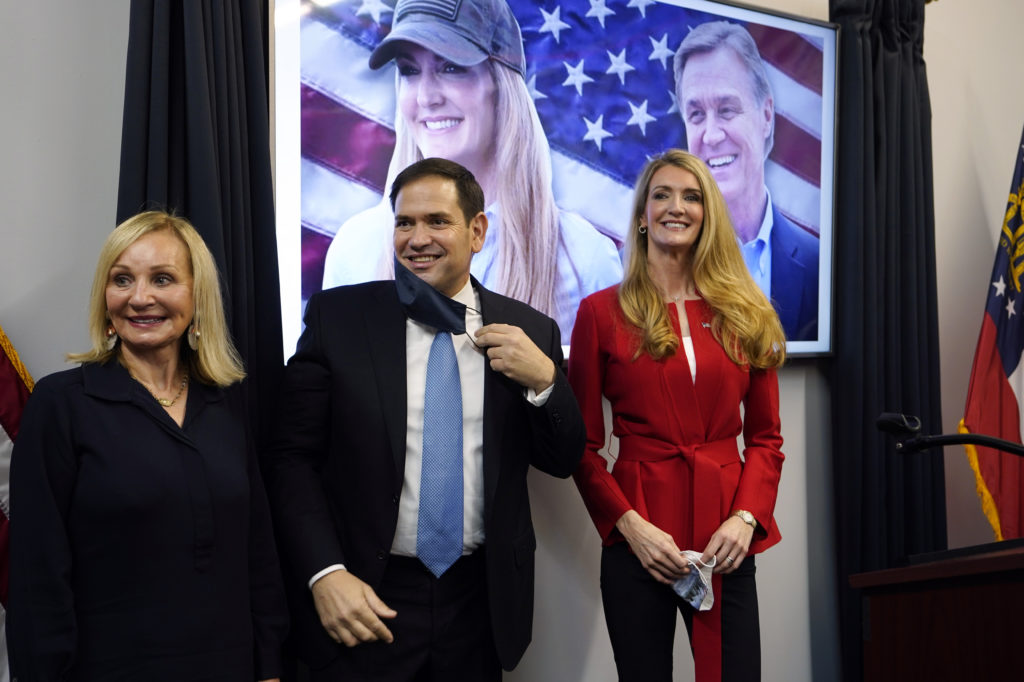
Socialists. Radical extremists. Marxists. Those over-the-top caricatures of Democrats make up Republicans’ opening arguments as they try to protect Georgia’s two U.S. senators who face strong challenges in Jan. 5 runoffs that’ll determine which party controls the chamber at the start of President-elect Joe Biden’s Democratic administration. Florida Sen. Marco Rubio led the charge Wednesday, campaigning in suburban Atlanta alongside Sen. Kelly Loeffler and warning that defeats for her and fellow Georgia Sen. David Perdue would hand over the U.S. government to “radical elements.” Loeffler went so far as to assert, without supporting details, that her Democratic challenger Raphael Warnock has “a Marxist ideology.” Loeffler took no questions after the event that filled the Cobb County Republican Party headquarters with hundreds of enthusiastic voters, many of them not wearing masks as coronavirus cases spike across the country. Warnock’s campaign pushed back, noting the Democrat’s policy preferences fall squarely within the U.S. political mainstream. Terrence Clark, a Warnock aide, said Loeffler is trying to “scare Georgians” while “misrepresenting” Warnock’s candidacy and obscuring her own record. It’s a familiar trope for Republicans to blast Democrats, especially in traditionally GOP-leaning states, as “too liberal” or even “socialist.” But the vehemence to open a two-month runoff blitz underscores the national stakes of Georgia’s unusual twin Senate contests and the sharp focus Republicans are putting on energizing core supporters for a second round of voting. The arguments come as Loeffler, Perdue, and other Georgia Republicans continue suggesting the Nov. 3 election — overseen by a Republican secretary of state — was rife with voting irregularities and tabulation errors, assertions made without evidence but that animate a GOP base still loyal to President Donald Trump even after his national defeat. “Turnout takes care of itself when the presidential race is on the ballot, so it can still boil down to persuasion in the middle,” said Republican consultant Chip Lake, a top adviser on Rep. Doug Collins’ unsuccessful bid against Loeffler. “In a runoff, it’s no longer about persuasion” Lake continued. “It’s about the bases.” Collins, now leading Trump’s recount efforts in Georgia, said the goal is to keep Republicans “fired up because they don’t want to see our country turn to a liberal perspective.” Republicans and Democrats are bracing for an unprecedented national-scale campaign in Georgia, a newfound two-party battleground where record turnout of roughly 5 million split almost evenly. Biden leads Trump by about 14,000 votes, but Secretary of State Brad Raffensperger announced plans Wednesday for an audit with a hand tally of ballots before certifying the results. Perdue, a staunch Trump ally first elected in 2014, led Democrat Jon Ossoff but fell short of the majority Georgia law requires for victory. Loeffler, appointed after Republican Sen. Johnny Isakson announced his retirement last year, trailed Warnock in an all-party primary to finish out the final two years of a six-year term. The Associated Press has called runoffs in both contests but hasn’t called Georgia’s 16 presidential electoral votes. Nationally, Republicans have secured 50 Senate seats to Democrats’ 48. Still, the GOP needs at least one of the Georgia seats to command a majority in January. In a 50-50 Senate, Democrats would have the tie-breaking vote in Vice President-elect Kamala Harris. Rubio and Loeffler warned of dire consequences, even as Rubio implicitly conceded the hyperbole. “To be fair, not all Democrats are socialists,” Rubio said. “But all socialists are Democrats.” Rubio alluded to failed presidential candidate Bernie Sanders, an independent who calls himself a democratic socialist and caucuses with Senate Democrats. Rubio nodded to progressive calls to “defund the police” and Democrats who support policies like “Medicare for All” single-payer health insurance or tuition-free public college nationwide. “All the energy” and “all the money” in the Democratic Party, Rubio insisted, come from such forces. Rubio didn’t mention Biden, who won the nomination and presidency as an establishment figure promising bipartisanship and compromise. Biden often noted as he campaigned that he defeated Sanders and other more liberal candidates for the nomination. “He thinks he’s running against someone else,” Biden quipped at Trump during an Oct. 22 debate when the president sought to label his challenger a socialist. Biden, for example, supports adding a “public option” government health care plan to existing insurance markets, but without ending private insurance. He backs significant public spending on green energy but opposes progressives’ push for quickly phasing out fossil fuels. Warnock and Ossoff have largely aligned behind Biden’s agenda, especially on a public option. Clark, Warnock’s spokesman, noted that Loeffler backs GOP efforts to roll back the 2010 Affordable Care Act that bars insurers from discriminating against customers based on their health history. He also saddled her with the GOP-run Senate’s failure to pass another coronavirus economic aid package as millions of Americans face the loss of jobless benefits, foreclosures, and evictions. Republicans nonetheless are doubling down after GOP Senate incumbents defeated well-financed challengers in more conservative states such as Iowa, Texas, and Montana, while Republican challengers knocked off several House Democrats who’d won moderate districts in 2018. Their bet is that Georgia, long a GOP stronghold before Biden’s performance in the presidential race, follows the same path. Republished with the permission of the Associated Press.
Dr. Brian S. Christine: A nation on the verge of a single-payer system: Let’s fix health-care in America, not turn it over to Washington

In this “through the looking glass” election cycle, when the topic of health-care is brought up the conversation defaults to Covid-19… mask or no mask?… when will there be a vaccine?… will there be a vaccine?… did the administration handle/mishandle its response to the pandemic?… and so on. However, this myopic focus on the Coronavirus places our nation at risk of ignoring the critical issues concerning U.S. health-care that will affect us citizens long after the virus has abated. Health-care spending accounts for 18% of the nation’s GDP, and that number rises with each passing year. Health-care costs are hurting our economy and threatening the economic stability of American workers, with out-of-pocket spending outpacing wage growth. An astounding 53% of those insured in high deductible plans have less in their savings than the deductible amount. Twenty percent of Americans have put off care of a serious condition because they fear the cost of treatment, and 20% of Americans have been in medical collections. Over-utilization of testing and the performance of unnecessary procedures for nothing more than financial gain do occur and contribute significantly to the bloat of health-care costs. It can seem like an unfixable mess. We would do well to remember, however, that the U.S. health-care system can and does offer the very best treatments available anywhere on the planet. The education, skill, and commitment of its doctors, nurses, and researchers cannot be bested, but the system is hemorrhaging and is in need of revitalization and improvement. It is not in need of wholesale replacement. Our health-care system is sick, but we must not zip it into a plastic bag and dump it in the morgue. Politicians from the political left who want a single-payer system are more influential than ever before. The current war cry from Democrats speaks to the “catastrophe” of what a Justice Amy Coney Barrett might allow the Supreme Court to do to the Affordable Care Act, but the real threat to health-care in America lies in Medicare-for-all legislation pending in the U.S. House of Representatives and the U.S. Senate. Two bills exist: H.R. 1384 sponsored by Representative Pramila Jaapal (D-WA) and S. 1129 sponsored by Senator Bernie Sanders (I-VT). Both of these bills force enrollment at birth. Both of these bills, if enacted into law, would make it unlawful for a private health insurer to sell insurance coverage that duplicates services covered under the national health plan and unlawful for an employer to provide benefits to an employee (or their dependents) that duplicates benefits covered under the national plan. These provisions are specifically designed to eliminate private health insurance and snuff out competition to a national Medicare-for-all system. Competition, transparency, and free market forces are exactly what are needed to improve U.S. health-care. Not a sweeping takeover. Not a Washington D.C. directed and controlled monolith that guarantees long wait-to-treat times and limited patient choice. We need to change how health-care is sold and delivered, and the changes should make it easier for individuals and employers to know exactly what services, drugs, and hospital visits will cost. Physicians, so long the ostriches in the health-care debate, must pull their heads from the sand and become active participants in reform. Simple changes, if enacted, would level a playing field that is very much tilted against the consumers of health-care, and would work to eliminate much of the expense that has nothing to do with patient care and wellness. If we are considering buying a suit or dress or eating at a restaurant, the price to be paid is a known quantity, but it is next to impossible for a patient to know, beforehand, the actual price for a procedure or test from a hospital or clinic. Layers of opaque price adjustments that vary depending on insurance provider, confusing medical codes, and less than helpful insurer and provider bureaucrats who insist that contracted rates are proprietary secrets and actively hide this information, all come together and form a barrier that keeps patients from knowing, upfront, what costs will be. Price transparency and easy access to this information is absolutely necessary to allow consumers to research, compare and choose where and from whom they will seek care; this has been proven to lower health-care costs by promoting competition and encouraging efforts to attract patients through lower prices and increased quality of care. Routine price transparency would also help to eliminate price gouging by providers and would do much to prevent an insured patient from receiving a surprise medical bill. Robust legislation is needed to require providers to publish actual, true costs for procedures, tests, and hospitalizations. Prescription drugs account for about 10% of U.S. health-care dollars spent annually. Here, too, cost and pricing transparency could lower expenditure. President Donald Trump’s recent executive orders aimed at passing-on insulin pricing discounts to low income Americans, allowing the importation of prescription drugs from Canada where prices are substantially lower, and prohibiting secret deals between drug manufacturers and pharmacy benefit managers that rob patients of drug discounts, are welcome and appreciated steps in health-care reform and improvement. As a practicing surgeon, I cannot stress enough that active involvement by physicians in efforts to lower cost and raise quality is long overdue. Doctors carrying out the hard work of identifying and policing those who over-test, over-treat, and over-bill will help to lower rising costs and restore confidence in a profession that, frankly, has lost some of its historic credibility with patients. A Medicare-for-all system would lack efficiency, would restrict patient choice, would guarantee longer waits for treatment, and would disincentivize individual practitioners and the medical tech and medical device industries, eroding their ethos of effort and innovation. However, these truths by themselves are no longer a sufficient argument to prevent a wholesale government takeover of health-care in America because our citizens are tired of rising costs and are terrified of economic ruin should they become seriously ill. Americans see their salaries and bonuses being consumed by escalating premiums and Everest-like deductibles. They


